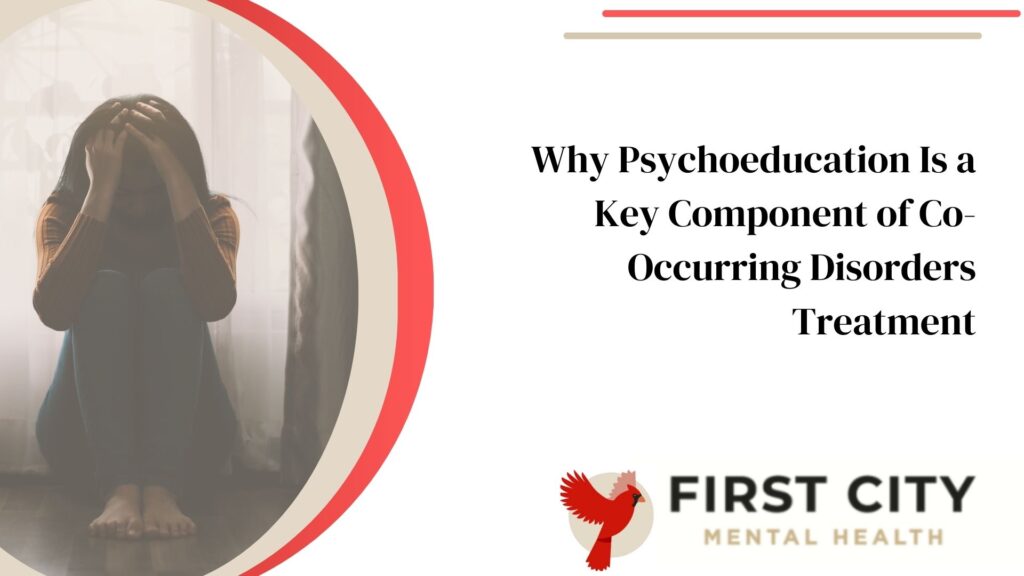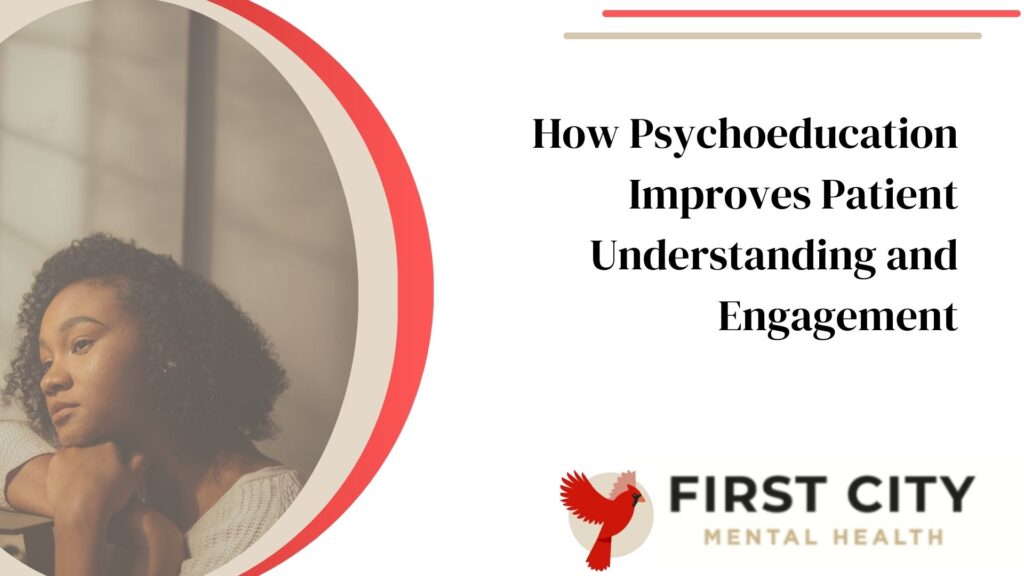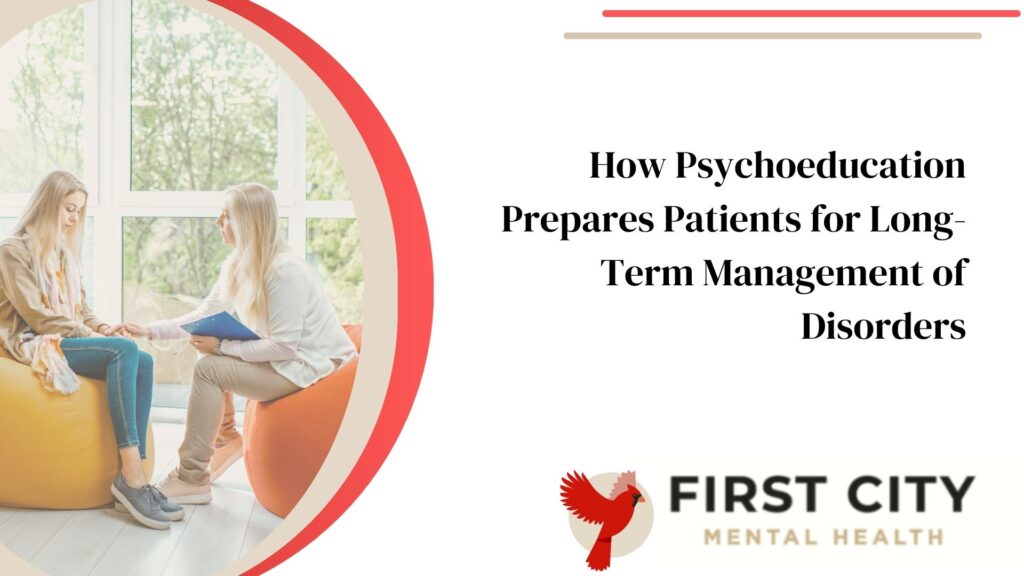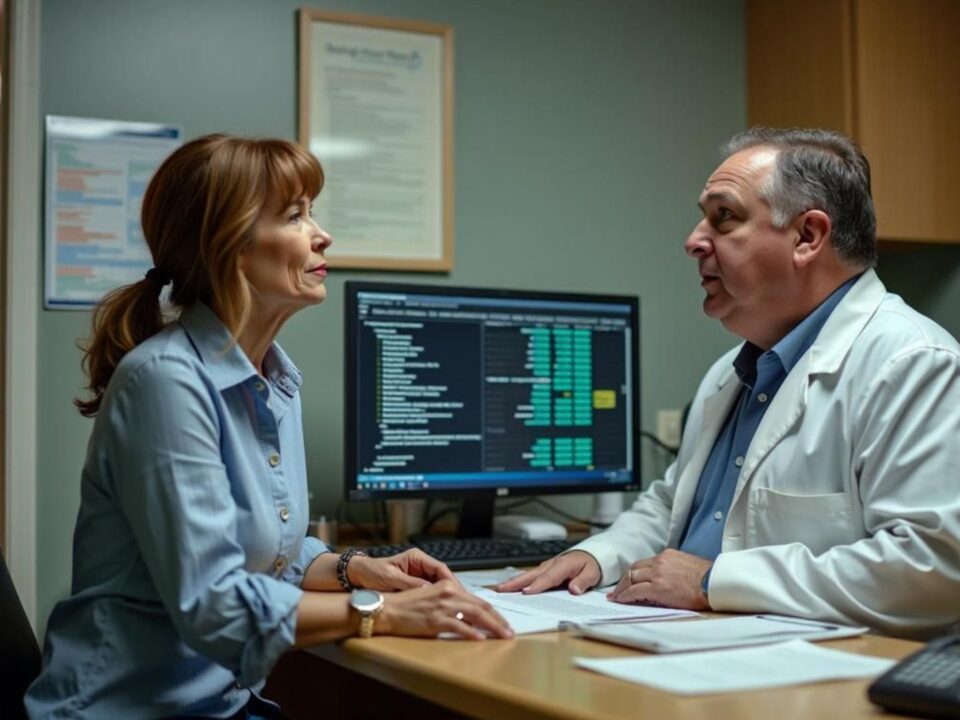
What Are the Long-Term Benefits of Co-Occurring Disorders Treatment?
January 20, 2025
How Does Anxiety Disorder Treatment Can Improve Your Life
January 20, 2025Effective co-occurring disorders treatment often involves something called psychoeducation. But what is it exactly? And why do experts swear by it when treating dual diagnoses?
Facing both a mental health disorder and a substance use issue can feel like running on a treadmill that’s set at full speed with no stop button in sight. Many people are overwhelmed, managing an endless cycle of symptoms and setbacks.
You might search for ways to break free from that exhausting loop if you’re reading this.
We’ll discuss the role of psychoeducation in the treatment of co-occurring disorders. You’ll learn how it helps patients better understand their conditions, when it’s introduced in treatment plans, and where you can access these valuable resources.
Key Takeaways
- Psychoeducation helps patients understand their mental health and substance use disorders. This knowledge reduces fear and boosts engagement in treatment.
- Early introduction of psychoeducation is key for mental health services administration. It provides a strong base for proactive care, improving overall treatment outcomes.
- Families benefit from attending psychoeducational sessions. They learn to spot symptoms early and support their loved ones better.
- Group-based psychoeducation creates a supportive community for mental health disorders and substance use disorder. Sharing experiences reduces stigma and isolation among participants.
- Access to resources like First City Mental Health in Kokomo, Indiana, offers workshops and classes that help manage co-occurring disorders effectively.
What Is Psychoeducation in the Context of Dual Diagnosis?
Psychoeducation helps people understand mental health and substance use disorders. It makes their conditions less scary by explaining them in plain language. This knowledge allows patients to handle their treatment better.
These sessions are usually run by mental health care providers in co-occurring disorders treatment in Kokomo, Indiana. They cover topics such as symptoms, treatments, self-care strategies, and support groups.
Why Psychoeducation Is a Key Component of Co-Occurring Disorders Treatment

An understanding of psychoeducation is crucial for dual-diagnosis patients. It provides essential information about mental health and substance abuse use disorders. Patients learn to identify their symptoms and understand different treatment options.
This knowledge empowers them, making them more likely to engage actively in their co-occurring disorders treatment program.
Informed patients experience reduced stigma about their conditions. Misconceptions fall away when they grasp how these disorders affect them. Psychoeducation delivers coping strategies, aiding individuals in managing symptoms better for mental disorders.
Co-occurring disorders treatment centers rely heavily on this approach because it enhances overall treatment effectiveness through increased awareness and personalized plans customized to each patient’s needs.
How Psychoeducation Improves Patient Understanding and Engagement
Psychoeducation helps patients understand their co-occurring disorders and treatment options. It reduces the stigma linked to mental health and substance use disorders. Patients learn how these conditions affect their daily lives.
This knowledge lets them actively take part in their own integrated treatment for co-occurring disorders plans for co occurring mental disorders.
Patients also gain key coping strategies and self-care techniques. They feel more engaged, which boosts their commitment to recovery. Psychoeducation improves communication between patients and healthcare providers, making it easier for everyone to work together effectively on integrated treatment for co-occurring disorders.
When Psychoeducation Should Be Introduced in Treatment Plans

Psychoeducation should be introduced early in the treatment of co-occurring disorders. Starting at the beginning ensures individuals gain a better understanding of their conditions.
This foundational knowledge enhances overall treatment outcomes and empowers patients to manage symptoms effectively.
Early psychoeducation also establishes a strong foundation for proactive care. Patients learn about various treatment options, which makes them more engaged in their recovery journey.
With this approach, adult co-occurring disorders and substance abuse treatment becomes more effective and meaningful, paving the way for long-term success.
Where Patients Can Access Psychoeducational Resources
First City Mental Health in Kokomo, Indiana, is an excellent choice for those seeking co-occurring disorders treatment centers. It provides comprehensive care and emphasizes psychoeducation. Patients can attend workshops and classes about their conditions and coping strategies.
Local community centers often host support groups, which sometimes include psychoeducational sessions. Libraries also offer books and videos on mental health topics. Reaching out to local hospitals might reveal seminars they hold about treating co-occurring disorders.
Online platforms like webinars can be another valuable resource for learning more about these treatments without leaving home.
Why Families Should Participate in Psychoeducational Sessions
Families enhance their support for loved ones dealing with co-occurring disorders by attending psychoeducational sessions. These gatherings teach families to recognize symptoms and warning signs early.
Understanding these nuances allows families to act faster and more effectively.
Psychoeducation also equips families with knowledge about various adult co-occurring disorders treatment options like psychotherapy and alternative therapies. This helps them provide proper support during recovery.
Participating in these sessions empowers families to create a nurturing environment, boosting the chances of successful treatment outcomes in Kokomo, Indiana, or elsewhere.
What Are the Benefits of Group-Based Psychoeducation?
Group-based psychoeducation gives people with co-occurring disorders the tools they need. Participants gain knowledge and skills to manage both mental health and substance use issues.
Sharing experiences in a group form a supportive community, reducing feelings of isolation.
These sessions also help reduce the stigma around mental health conditions. Patients learn more about their symptoms, which aids in better management. Tailoring content to meet diverse needs makes it practical for various co-occurring disorders.
Individuals often see improved outcomes and well-being by taking an active role in treatment for co occurring disorders.
How Psychoeducation Prepares Patients for Long-Term Management of Disorders

Psychoeducation gives patients the tools they need to manage their disorders long-term. It offers a deep understanding of their diagnoses, symptoms, and how these affect daily life.
Patients learn about various treatment of co-occurring disorders methods, including medication and therapy options. This knowledge helps them make informed choices about their care.
Patients also gain coping strategies through psychoeducation. These skills are vital for managing symptoms on a day-to-day basis. Knowing what to expect reduces anxiety and builds confidence in handling challenges ahead.
Engaging in this process empowers them to take charge of their recovery journey. Reducing stigma with accurate information can be incredibly liberating for those grappling with mental health and substance use issues in co-occurring disorders treatment plans in Kokomo, Indiana, or elsewhere.
Final Thoughts
Co-occurring disorders treatment program need special care and attention. Psychoeducation helps patients understand their conditions better. It empowers them with knowledge to manage both mental health and substance use issues.
This approach is simple yet effective in promoting long-term recovery. For those seeking help, Kokomo, Indiana, offers valuable resources for treating co-occurring disorders. Individuals can significantly improve their quality of life by investing time in psychoeducation.
Families should also join these sessions to support their loved ones fully. So, take action today! Equip yourself or your loved one with the right information and skills to bravely face dual diagnoses.
FAQs
What is psychoeducation in the context of co-occurring disorders treatment?
Psychoeducation involves teaching patients about their mental health and substance use issues. It helps them understand how these conditions interact, which is crucial for effective treatment for co-occurring disorders.
How does psychoeducation benefit individuals undergoing co-occurring disorders treatment in Kokomo, Indiana?
In Kokomo, Indiana, psychoeducation empowers patients by providing knowledge about their conditions. This understanding aids in managing symptoms and making informed decisions during the treatment journey for co-occurring disorders.
Can families benefit from psychoeducation when dealing with a loved one’s co-occurring disorders?
Absolutely! Families gain insight into the challenges faced by their loved ones through psychoeducation. This awareness fosters empathy and better support during the difficult process of treating co occurring disorders.
Are there specific topics covered in psychoeducational sessions for those receiving treatment for co occurring disorders?
Yes, sessions often cover symptom management strategies, relapse prevention techniques, and coping skills tailored to each individual’s needs within the context of their dual diagnosis.






